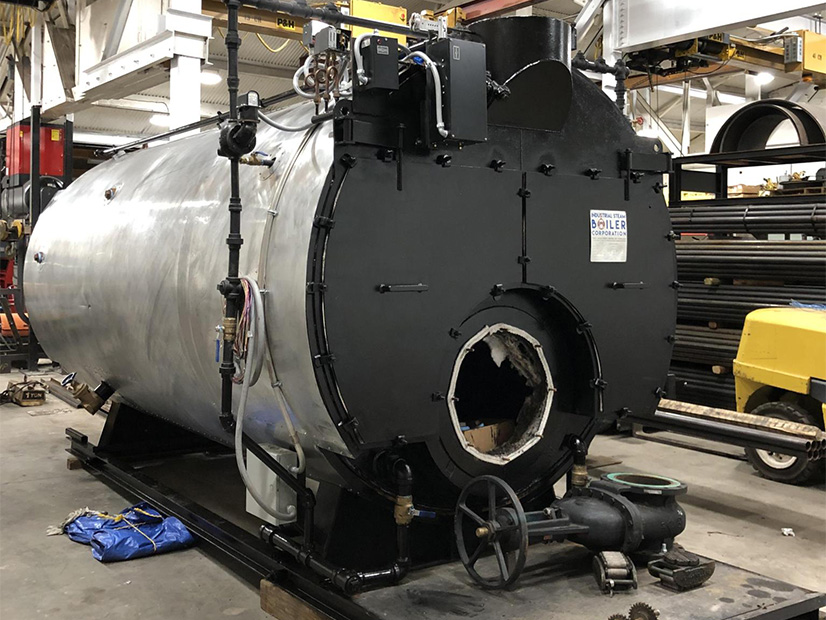
The Department of Energy must provide better justification for its 2020 rule increasing the energy efficiency standards of boilers used in commercial buildings and multifamily housing, the D.C. Circuit Court of Appeals ruled Tuesday, giving the department 90 days to respond.
In issuing the remand, the court said DOE exaggerated the savings that would result from its rule on commercial-packaged boilers. The rule was more stringent than the standards of the American Society of Heating, Refrigerating and Air-Conditioning Engineers (ASHRAE).
The Energy Policy and Conservation Act prohibits DOE from establishing a standard more stringent than ASHRAE’s, barring “clear and convincing evidence” that it is economically justified, technically feasible and will lead to significant energy savings.
Commercial-packaged boilers are gas- or oil-fired and have rated inputs of at least 300 kBtu/h and are used for space conditioning and/or water heating. DOE said the rule, which was set to take effect in January 2023, would save consumers $36,832 for a large oil-fired boiler, a payback of 2.7 years out of an estimated 25-year lifespan.
The rule was challenged by the American Public Gas Association, which represents publicly owned gas distribution systems; the Air-Conditioning, Heating & Refrigeration Institute (AHRI), which represents manufacturers; and Spire Inc., an owner of gas utilities, including Spire Missouri. The American Gas Association, which represents local distribution utilities, intervened in support of the challengers.
The three-judge panel — Chief Judge Sri Srinivasan, Circuit Judge Ketanji Brown Jackson and Senior Circuit Judge Douglas H. Ginsburg, who wrote the opinion — noted that the “clear and convincing evidence” standard “is unusual,” saying, “We are aware of no other authorization for rulemaking subject to this heightened evidentiary standard.
“This unusual framework creates an unusually strong bias in favor of the status quo,” it added.
Bad Assumptions
The law requires DOE to consider the difference in the life-cycle cost (LCC) of equipment with and without a more stringent standard and the projected energy savings likely to result from the standard. The LCC is the sum of the purchase price (including installation) and lifetime operating cost (fuel, maintenance and repairs), discounted to present value.
The LCC analysis required DOE to describe the mix of boilers if it issued no new standards versus the mix with the new rules.
DOE said it had historical shipping data — the most accurate picture of the mix of boilers in a world without new standards — for only two of the eight relevant categories of boilers. Thus, it assumed the distribution of efficiency levels in shipped equipment was the same as that found in models listed in the database maintained by the AHRI.
In its “no-new-standards case,” DOE assumed the distribution of efficiencies among shipped boilers is the same as the distribution of efficiencies across the models listed in the AHRI database.
“As a result, when the DOE ran trials randomly assigning boilers to buildings in the no-new-standards case, the chance a boiler with a certain efficiency level would be assigned to a building in the sample was equal to the percentage of boilers in the AHRI database with that efficiency level, without regard to the characteristics of the building to which the boiler was assigned,” the court observed. In doing so, the court found, DOE failed to acknowledge that a rational building owner would consider the costs and benefits of its new boiler purchase to produce the best economic performance for its building.
“If a purchaser selects the most efficient unit for its building, then the DOE’s model will assign the benefits of that choice to its rule, rather than attributing it, correctly, to the purchaser’s rational decision-making,” the court said, inflating the economic value of the more stringent standard.
The court said DOE was “dismissive” in rejecting comments challenging its random assignment.
“DOE essentially said it did the best it could with the data it had. This is not enough to justify assuming a purchaser’s decisions will not align with its economic interests in purchasing a boiler,” the court said. “Indeed, the DOE’s lackadaisical response would have been inadequate even if the rulemaking were not governed by a heightened evidentiary standard, for the DOE’s failure to ‘engage the arguments raised before it.’”
The court also said DOE “significantly overstated” the fuel cost savings from the new standard.
“Because operators of commercial packaged boilers are among the largest purchasers of fuel from energy utilities, they receive volume discounts and enter into hedging contracts, and therefore pay significantly less” than predicted average energy prices, the court noted.
And it said the agency exaggerated in estimating that the median burner operating hours — a “crucial” variable in the LCC analysis — for most burners was more than 1,000 hours per year.
It cited an AHRI consultant who said “commercial buildings are generally cooling load dominated, so it would be highly unusual to have 1,000 system operating hours per year.”
“By no stretch was this an exemplar of reasoned decision-making,” the court said. “A commenter pointed to seeming anomalies in the DOE’s data, and the agency ignored them.”
Remedy
DOE told the court it expected to be able to provide “a full and sound” justification satisfying the clear and convincing evidence standard.
“Under these circumstances, we think it should be afforded a limited opportunity to do so,” the court said. “Therefore, we shall remand the final rule to the DOE for the agency to take appropriate remedial action within 90 days. If the DOE fails to do so, the final rule will automatically be vacated unless the agency demonstrates within 10 days of the issuance of this decision the need for additional time.”



